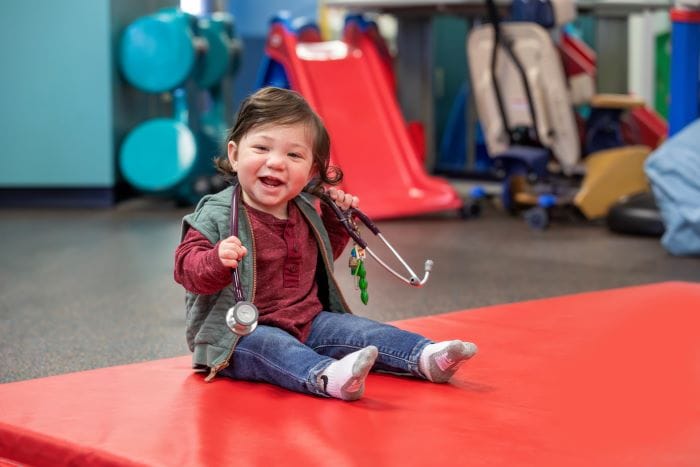Evan’s Fight to a Healthy Heart
Patricia and Chris were ecstatic to tell family and friends that they were expecting. What they did not expect however, were concerns after their baby’s 18-week anatomy scan.
“When they came in and told us something was wrong with his heart, we were just completely shocked,” Patricia recalls.
Doctors referred Patricia to Courtney Wein, D.O., a pediatric and fetal cardiologist at Johns Hopkins All Children’s Heart Institute, for a fetal echocardiogram. This in-depth evaluation of the baby’s heart confirmed he had truncus arteriosus. Truncus arteriosus is a rare and complex congenital heart defect where only one blood vessel (instead of two) comes off of the heart and gives rise to both the lung and body’s arteries.
However, what started off as a difficult diagnosis transformed into a journey of mutual trust.
“Dr. Wein really made all the difference,” says Patricia, holding back tears. “She asked if we had a name for our baby boy and from that moment on, she always referred to him as ‘Evan.’ She said, ‘I’m a part of your team now. This is our baby.’ Dr. Wein promised us she'd be with us every step of the way, any day, any time—and she was.”
“Being a mother myself, I know how important this child is to them,” Wein says, adding that when delivering a congenital heart disease diagnosis, the team walks families through, step-by-step, with the utmost patience and care. “I try to give space so it can be a conversation. I show diagrams and discuss what the heart defect is. I give the family time to process and express their thoughts and feelings. Hearing this news is different from what you anticipate when you first learn of your pregnancy, so I want to be open to hear their thoughts and concerns as they digest the news. No question is silly!”
Patricia and Chris say the Johns Hopkins All Children’s Heart Institute team was always available to their family.

“There was such a wealth of resources that were made available to us. When you're in that situation, you have no idea what to expect and you're in a kind of shock. So, the team at Johns Hopkins All Children’s really helped us navigate the entire process and feel as prepared as you can in that situation,” says Patricia. Now, all that was left was to wait for baby Evan’s arrival.
In March 2023, doctors induced Patricia and she started having contractions, but Evan’s heart rate began dropping. After about 24 hours in labor, they proceeded with a cesarean section. Evan arrived into the world with a full head of hair and seemingly no emergent complications, but he was quickly whisked to the cardiovascular intensive care unit (CVICU) for monitoring.
In his first few days of life, the team noticed Evan was working to breathe, as well as fatiguing overall and feeding poorly. At only 10 days old, with a heart the size of a walnut, Evan had his first open-heart surgery with James Quintessenza, M.D. A specialized tube (conduit) was placed to create effective circulations to both his lungs and body.
“Dr. Q was incredible, and we could not have been in better hands,” says Patricia. “Nothing fazes him. We felt confident that nothing could happen in that surgical suite that Dr. Q wouldn't be ready for.”
Surgery was a success. However, only a few days later, Evan had a setback with a pulmonary hypertensive crisis that required expert resuscitation.
Following a few weeks of recovery, Evan was able to go home. He was on a feeding tube and needed time to heal. Wein continued to check on the recovery of his heart.
That summer, Wein noticed Evan showing signs of respiratory distress. She recommended a cardiac catheterization to determine the next course of action. James Thompson, M.D., an interventional cardiologist, discovered that Evan had two large aneurysms pushing on his heart and lungs.
“We both cried a little, but we were relieved that we caught this and were eager to move forward,” Wein says, recalling how Evan would have to proceed with another surgery much sooner than anticipated. “He is a rock star though, and he did great!”
Evan left the hospital 10 days later.
Today, Evan’s doing great, and every visit with his heart team ends with a smile.
“Evan’s developing well and meeting his milestones,” Wein says. “Our little rock star has been able to successfully wean off the feeding tube and is doing fantastically.”
His parents have been thrilled with his progress too and consider the heart team a part of their family. “It's amazing watching him grow into his own person, and we're so thankful to Johns Hopkins for making it possible,” says the proud dad.
 Dr. Wein specializes in pediatric and fetal cardiology at Johns Hopkins All Children’s. She sees patients primarily at the Outpatient Care location in Tampa. She joined the hospital staff in 2020.
Dr. Wein specializes in pediatric and fetal cardiology at Johns Hopkins All Children’s. She sees patients primarily at the Outpatient Care location in Tampa. She joined the hospital staff in 2020.
Dr. Wein earned her medical degree from Philadelphia College of Osteopathic Medicine in Pennsylvania. She then completed a residency in pediatrics at St. Christopher’s Hospital for Children in Philadelphia, followed by a fellowship in pediatric cardiology at Nicklaus Children’s Hospital in Miami with additional training in fetal echocardiography at Mount Sinai Kravis Children’s Hospital in New York City. Her clinical interests include fetal cardiology, preventative medicine and neurodevelopment in children with congenital heart disease.
*Presented by Johns Hopkins All Children's Hospital | Originally published in February 2024 of Tampa Bay Parenting Magazine


